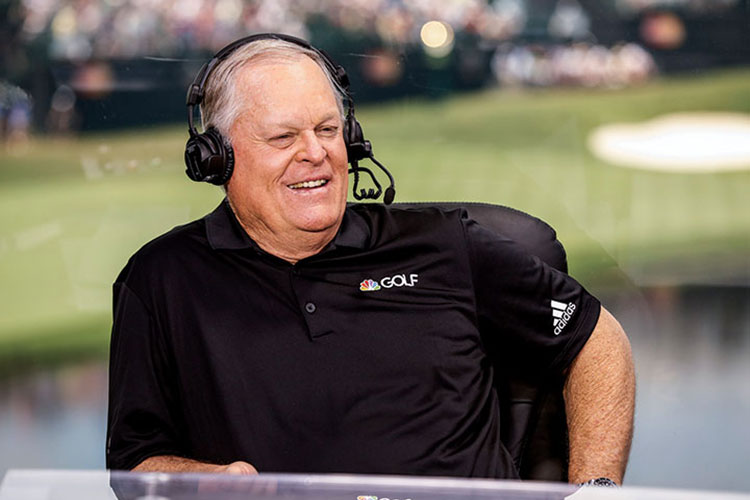
Over the last quarter-century, there have been two classes of golf announcers: Johnny Miller and everybody else. This isn’t a knock on all the other guys, merely recognition that Miller reinvented the medium with his insight, candor and gallows humor. On February 3rd, at the final round of the Phoenix Open, an era will end when Miller, 71, signs off from NBC’s 18th hole tower and struts into retirement.
His lovely home in Pacific Grove beckons, and he longs to spend more time with his 24 grandchildren.
“The call of being there for my grandkids to teach them how to golf and fish, I felt it was a higher calling,” Miller said in making his announcement. “Their parents are trying to make a living and grandparents can be there like my father was with my four boys. He was there every day for them. I’m a big believer that there is a time and a season for everything.” It sounds like a nice life, and he deserves it, but Miller will be dearly missed.
Championship golf borders on the metaphysical, and Miller has been the perfect tour guide through the players’ collective psyches. Before he came along, golf commentary skewed toward cloying, but Miller introduced pathos to the telecast. He punctured the myth that the players were heroic gladiators in pleated pants; in Miller’s worldview, every swing is a train wreck waiting to happen, every missed putt a kind of MRI of the soul.
Whenever calamity struck on Sunday afternoons, Miller was likely to blurt out, “That’s nerves.” Maybe, maybe not, but he always worked dark, and through the years, plenty of players chafed at his pessimism. But they should have been thanking Miller all along—he was helping them by illuminating to the viewer the exquisite torture of tournament golf. Miller wasn’t a critic, he was a serial empathizer.
Yes, there were times when Miller could seem like a kid in the front row of a classroom frantically waving his hand, eager to show how smart he is. Whenever a player faced a straightforward chip, Miller liked to say, “He can chip this in,” so if the player did, our man in the booth looked like a sage.
Of course, 99% of the time the player didn’t chip it in. But we forgave Miller his indulgences because he made us much smarter fans. He was an obsessive preparer. During tournament weeks, he would spend as much time on the putting surfaces as any caddie, searching for his beloved fall line, a skiing term that revealed the pitch of the green and thus the break of any given putt. (Many a weekend golfer now employs the term ‘fall line,’ for better or worse.)
He was an ace illuminator of swing flaws and course management blunders and you could learn a heckuva lot if you paid attention. Of course, Miller was also an entertainer, and he seemed to know how much we all delighted in his pleasing get-off-my-lawn critiques. One of my favorite barbs came at the 2008 BMW Championship, when Miller bitingly described a low round by dour Jim Furyk as the “first time in history someone’s shot 62 and never smiled.”
The irony is that during his Hall of Fame playing career, Miller was brutally self-lacerating. He has admitted that throughout his historic final round 63 to win the 1973 U.S. Open at Oakmont, his only swing thought was, “Don’t shank!” because he was still haunted by a hosel-rocket that occurred at the Crosby Clambake earlier that year.
But most of his Pebble Beach memories are rosier. Miller grew up in San Francisco, honing his game at the Olympic Club. He often talked his dad into bringing him to Pebble and he fell in love with the course.
The tiny greens brought out the best in maybe the greatest iron player of all time, and Miller would go on to win three Crosby Clambakes. The final victory of his career came at Pebble Beach in 1994, when he was a 46-year-old part-time golfer haunted by the yips. But this crafty veteran adroitly navigated his way around Pebble and in a riveting duel, nipped Tom Watson, an old rival.
For all of his alpha male energy, Miller was never afraid to show his emotions, and he cried like a baby after that victory. In the years since, he has gotten choked up plenty of times on the air. Saying goodbye won’t be easy. But Miller can leave the broadcast booth content with the knowledge that no one has ever done it better.